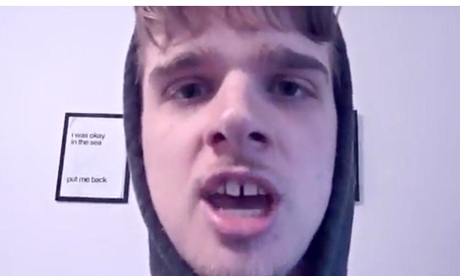With their texts, tweets and Tumblr blogs, alt lit stars such as Steve Roggenbuck are bringing poetry to a new audience

Steve Roggenbuck: alt lit star and co-founder of Boost House.
Steve Roggenbuck published his first YouTube video (that I know about) in 2010: close-ups of a chapbook of short poems set to a jarring yet beautiful electronic soundtrack. It was followed by hundreds more: often shouty, urgent diatribes with titles such as "make something beautiful before you are dead" and "I think the moon is Awesome", recorded in fields and friends' bathrooms on constant tours. You can also watch him read the entirety of "i love you, before long I die: a walt whitman mixtape", an hour and 15 minutes of his favourite bits of Walt Whitman, cut up and remixed and published in a print. He has published ebooks and print books, and commits to releasing everything online, and for free, alongside paying publications.
Roggenbuck is one of the central figures of the scene termed "alt lit", a sprawling online community of writers, whose work takes every form from instant messenger and text message logs to essays, image macros, tweets and Tumblr blogs. Alt lit has a vitality to it that is born of the internet itself, and is reflected in the name of Roggenbuck's joint publishing venture with Emily Elizabeth Scott
and Rachel Younghans, run out of a vegan co-op in Maine. Boost House is both publisher and community-building exercise; "boosting" is their term for supporting and energising a whole generation of writers. They recently published The Yolo Pages, an anthology of more than 50 writers from the alt lit, "weird Twitter" and "flarf" scenes. It sounds weird indeed, and it is exhilarating.
What's exciting about alt lit is its commitment to, in Roggenbuck's words, "the new forms that poetry, humour and spirituality might take on the internet". Rather than trying to fit old forms to new technology, Roggenbuck and his peers bring the romantic intensity of poetry to new audiences and platforms online, freely sharing their experiments and encouraging others to join in.
Roggenbuck is one of the central figures of the scene termed "alt lit", a sprawling online community of writers, whose work takes every form from instant messenger and text message logs to essays, image macros, tweets and Tumblr blogs. Alt lit has a vitality to it that is born of the internet itself, and is reflected in the name of Roggenbuck's joint publishing venture with Emily Elizabeth Scott
and Rachel Younghans, run out of a vegan co-op in Maine. Boost House is both publisher and community-building exercise; "boosting" is their term for supporting and energising a whole generation of writers. They recently published The Yolo Pages, an anthology of more than 50 writers from the alt lit, "weird Twitter" and "flarf" scenes. It sounds weird indeed, and it is exhilarating.
What's exciting about alt lit is its commitment to, in Roggenbuck's words, "the new forms that poetry, humour and spirituality might take on the internet". Rather than trying to fit old forms to new technology, Roggenbuck and his peers bring the romantic intensity of poetry to new audiences and platforms online, freely sharing their experiments and encouraging others to join in.
No comments:
Post a Comment